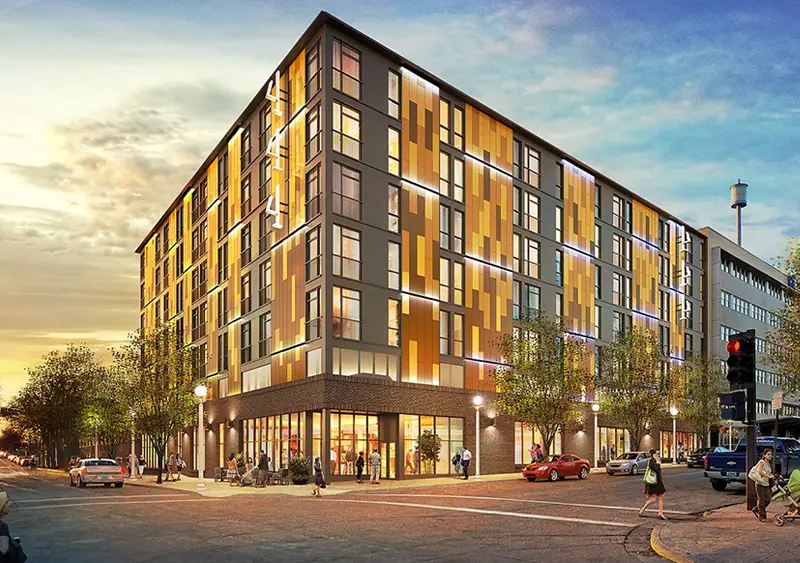Why You Should Outsource 3D Architectural Rendering in 2025
Great design starts with great vision

4 MIN READ
May 28, 2025

Written By
Rahimudeen M
But building a dedicated in-house team is costly, slow, and resource-heavy. That’s where outsourcing comes in not as a fallback, but as a smarter, more scalable solution. In 2025, firms that outsource 3D architectural rendering are not just cutting costs. They’re unlocking flexibility, global talent, and turnaround times that move as fast as the market does.
Let’s explore why outsourcing is becoming the strategic move forward not just a cost-cutting tactic.
What Is 3D Architectural Rendering?
3D architectural rendering is the process of turning architectural plans into lifelike digital images. These visuals go beyond technical drawings or blueprints. They help stakeholders see a space before it’s built complete with textures, lighting, materials, and surroundings. Whether it's a residential project, commercial property, or an urban master plan, rendering translates vision into clarity.
When Should You Consider 3D Rendering Outsourcing?
Outsourcing 3D architectural rendering isn’t just a cost-saving strategy. It’s a growth lever one that allows firms to scale capabilities without scaling overheads.
But how do you know when it’s time to make the shift?
Here are key indicators it’s time to rethink your rendering model:
Your Projects Are Getting Bigger, Faster
What started as small residential designs have evolved into commercial towers, masterplans, and mixed-use developments. Larger projects come with tighter timelines, higher client expectations, and more visual deliverables. If your current in-house setup can't scale with this demand, outsourcing gives you flexible support without the hiring cycles or infrastructure bottlenecks.
Your Internal Team Is Operating at Full Capacity
Deadlines are slipping. Teams are stretched. Revisions are piling up. If this sounds familiar, it’s not a talent issue it’s a resource one. Outsourcing offers instant bandwidth. With the right external partner, you can handle a growing pipeline without compromising creativity or accuracy.
You Want to Offer Modern Visualization Experiences Like AR/VR
Clients are no longer satisfied with static renders alone. From real estate walkthroughs to virtual staging, immersive experiences are now expected. But implementing AR/VR internally requires high-end software, deep technical know-how, and time your team may not have. Outsourcing gives you access to cutting-edge visualization without needing to reinvent your studio from scratch.
You’re Facing Rising Pressure to Maintain Quality While Cutting Costs
Budgets are shrinking, but expectations aren’t. When you need to keep margins healthy while delivering top-tier visuals, outsourcing becomes more than a cost cut it becomes a strategic tool. You pay only for the output you need, avoid long-term payroll commitments, and still meet the quality standards your brand demands.
4 Ways to Choose the Right 3D Rendering Outsourcing Partner
Not all rendering studios are built the same.
Choosing the wrong one can lead to missed deadlines, off-brand visuals, and frustrated clients. But the right partner? They’ll operate like an extension of your in-house team. Here’s how to vet them properly:
1. Look for Deep Experience in Architectural Visualization Services
The ideal partner isn’t just good at rendering they understand space, structure, and storytelling.Prioritize vendors with proven expertise in real estate, construction, or design sectors—those who understand the benefits of outsourcing 3D architectural visualization and can deliver with precision.
2. Evaluate Quality Standards and Style Compatibility
Your brand has a visual language. Your outsourcing partner should speak it fluently. Ask for past work samples that mirror your design aesthetic. Consistency, photorealism, and the ability to convey emotion through space are all hallmarks of a high-quality rendering team.
3. Prioritize Clear Communication and Project Management
Miscommunication kills momentum. A reliable partner should offer:
- Transparent timelines and delivery stages
- Dedicated project managers
- Regular updates, checkpoints, and revision cycles
This isn’t just about efficiency it’s about building trust.
4. Understand Their Pricing Models and Flexibility
Every project has unique needs. Choose a team that offers:
- Clear, transparent pricing (no hidden charges)
- Scalable options based on your project size and timeline
- Defined revision policies to prevent surprises
When these pieces align, outsourcing becomes a seamless extension of your own studio not a workaround.
Conclusion
Outsourcing 3D architectural rendering in 2025 is a strategic design decision. As client demands grow sharper and timelines grow shorter, outsourcing gives you an edge: global talent, scalable capacity, and stunning visual outcomes without stretching your internal resources.
The firms that win tomorrow won’t be the ones doing everything themselves. They’ll be the ones who know what to keep in-house and who to partner with for everything else.
If your goal is to present with confidence, deliver on time, and stay focused on what your team does best, it’s time to stop managing renders and start managing results.
ZealousXR is ready to be your extended team.Let’s turn ideas into immersive experiences that close deals faster and smarter.
About the writer :
Rahimudeen M is the Senior Operations Manager at Zealous Services, with over 17 years of experience in project ... management and client success. He ensures smooth operations across 3D visualization, animation, and modeling projects. A natural leader, Rahimudeen is passionate about building high-performing teams and delivering top-tier results for clients across global markets.
Read MoreFrequently Asked Questions (FAQ)
Is outsourcing 3D architectural rendering more cost-effective than doing it in-house?
Yes, especially in 2025. Building an in-house rendering team involves hiring specialized talent, investing in hardware, and maintaining expensive software licenses. By outsourcing, you eliminate fixed costs and only pay for deliverables, making it easier to manage your budget while scaling up as needed.
How do I ensure quality when working with an external rendering company?
Quality comes down to choosing the right partner. Look for a provider with a strong portfolio in architecture and real estate, consistent visual style, and an understanding of construction-level detailing. A well-structured onboarding process, clear communication, and defined review cycles can make collaboration seamless and output dependable.
What types of projects are ideal for 3D rendering outsourcing?
Outsourcing works well for a wide range of use cases from residential interiors to large-scale commercial developments. It’s particularly valuable for pre-launch marketing, client presentations, planning approvals, and investor pitches.
Will outsourcing slow down our design process?
Quite the opposite. Reputable visualization companies have dedicated teams that work on tight turnarounds and often operate across time zones for faster delivery. With the right communication and workflows in place, you can move faster presenting visuals to clients while your core team continues design development.
Why choose ZealousXR for architectural visualization outsourcing?
ZealousXR blends creative precision with technical depth. Our team understands the nuances of architectural detailing and the importance of photorealism. Whether you're showcasing a penthouse interior or a full master plan, we deliver renders that speak to your buyers and stakeholders.